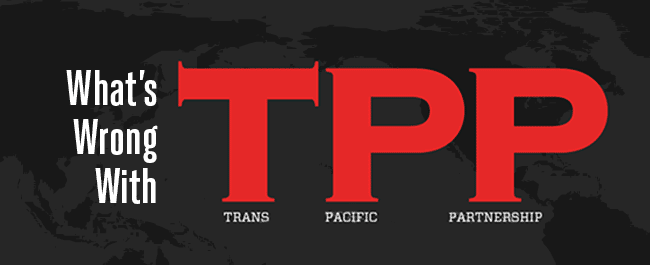Have You Heard of the TPP Yet? An Important Trade Agreement You Need to Know About
Trade is relevant. The U.S. trade deficit, which has grown from a little more than $70 billion in 1993, the year before NAFTA went into effect, to nearly $540 billion today, costs us jobs. Trade deficits represent lost opportunities. The bigger the trade deficit, the more jobs we could have created in the United States but didn’t. Moreover, trade agreements affect our domestic laws. Once we enter into a trade agreement, it’s not so easy to raise tariffs on trading partners that engage in egregious human rights violations—nor is it easy to exit the agreement once we find out it is bad for our economy and our job creation.
Trade also is interesting. Trade rules affect your rights in the workplace, the safety of the food you eat and how clean your water is. Trade rules can affect whether tuna canneries are allowed to tell you if your tuna is dolphin-safe or whether local grocery stores have to label the hamburger you buy with its country of origin. Trade rules can affect the price of the fancy imported cheese you like or how much North American content must be in an automobile for it to qualify for the tariff benefits of NAFTA. And trade rules also can make it easier for an employer to shut down a factory, call center or legal support office and move it overseas. Trade is anything but boring.
And the debate is certainly not over. The proposed TPP is not yet finished—the rules are still being written. Will those rules largely mimic the rules that have helped kill off nearly 6 million manufacturing jobs in the United States in just over a decade? On the other hand, will the rules help make it easier for our brothers and sisters overseas to organize and act collectively to improve their wages and working conditions? Will the rules require our trading partners to protect endangered species? Or will they make it easier for giant global corporations to attack laws banning toxic chemicals? We don’t know the answer to these questions yet—because the deal isn’t done. But if the loudest voices the administration and Congress hear belong to the global corporations who have benefited from past agreements, I can predict what the answers will be. And they won’t be answers we like. If you have not yet spoken up to tell President Obama that America can’t take another NAFTA, now is the time. The president wants to finish negotiating the agreement by October 2013. Tomorrow may be too late.



Leave a Reply
Want to join the discussion?Feel free to contribute!